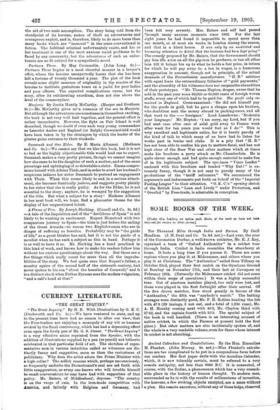C URRENT LITERAT ETRE.
"THE GREAT INQUIRY."
"The Great Inquiry." By H. B. With Illustrations by G. K. C. (Duckworth and Co. ls.)—We have ventured to state, and up to the present time have had no reason to alter our view, that the Free-traders are enjoying a monopoly of any wit or humour evoked by the fiscal controversy, which has had a depressing effect even upon the lively pen of Mr. G. S. Street. "The Great Inquiry" is a very effective satire reprinted from the Speaker, with the addition of illustrations supplied by a pen (or pencil) not hitherto celebrated in that particular field of art. The sketches of repre- ;mutative men in various industries called as witnesses are dis- tinctly funny and suggestive, more so than the caricatures of politicians. Why does the artist adorn the Prime Minister with a high collar? The selfish reasons which, perhaps unconsciously, so frequently underlie the Protectionist's zeal are set forth with little exaggeration, as every one knows who will trouble himself to recall conversations he may have had with supporters 9f that policy. Mr. • Baines, of Middlesboro', deposes: "The country is' on the verge of ruin. In the iron-trade competition with America, and latterly with Belgibm and GerMany, had been felt very severely. Mrs. Baines and self had passed through many anxious moments since 1892. For the last eight years he had found it impossible to spend *mere than one month, or at most six weeks, in London during the'sesson, and that in a hired house. It was only by an unstinted and harassing attention to detail that the business had been kept *going." The remedy proposed by Mr. Baines, that the Government should pay him 255. a ton on all the pig-iron he produces, or tax all other iron till it brings his up to what he holds a fair price, in return for which he will pay away 5s. a ton in wages, is a humorous exaggeration in amount, though not in principle, of the actual demands of the Protectionist manufacturer. "H. B." satirises with equal force the extraordinary fallacies of "gold payments," and the absurdity of his witnesses does not surpass the absurdities of their prototypes. " Mr. Thomas Hepton, draper, swore that he sold in the past year some 50,000 or 60,000 cases of foreign woven stuffs, every one of which had to he paid for. The profit only re- mained in England. Cross-examined: 'He did not himself pay for the goods in gold, but he gave a cheque upon his bankers, who doubtless sent the money abroad in packing-cases, and all that went to the — foreigner.' Lord Lansdowne : Moderate your language.' Mr. Hepton : I am sorry, my Lord, but 'if you had sent case after case of solid gold away to France week after week for ten years you would feel as I do.'" This is very excellent and legitimate satire, for it is barely parody of the kind of talk to which many of us have had to listen for weeks past in trains' and clubs. It is a pity that " H. B." has not been able to confine his pen to matters fiscal, and has not kept clear of the Boer War and other matters which at times make his brochure a party attack on Mr. Chamberlain. He is quite clever enough and had quite enough material to make fun of in his legitimate subject. The specimen " Vince Leaflet" enclosed with this brochure and headed "Why Eat ?" is ex- tremely funny, though it is not easy to parody many of the productions of the "tariff reformers." We recommend the arguments and inducements put forth on behalf of the " Imperial Fasting League" to their attention. "G. K. C.'s " opening sketch of the British Lion " Lean and Lively " under Protection, and " Overfed " by Free-trade, is admirable in conception.






































 Previous page
Previous page